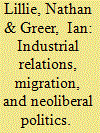|
|
|
Sort Order |
|
|
|
Items / Page
|
|
|
|
|
|
|
| Srl | Item |
| 1 |
ID:
099106


|
|
|
|
|
| Publication |
2010.
|
| Summary/Abstract |
This article argues that off-shore is losing its exceptionality by being absorbed into a broader process of variegation and deterritorialization of sovereignty, and that capital's search for a new "fix" is driving this process. Capital goes off-shore by exploiting non-territorial definitions of sovereignty, as a means of shifting the regulatory regime under which social relations take place, without moving in a geographic sense. In this way, capital shields itself from social control by defining certain spaces and contexts as off-shore, creating spaces of production in which the sovereign regulatory capacities of the state and society are systematically constrained. This "unbundling" and deterritorialization of sovereignty is a way for capital to escape from national class compromises and undermine working-class associational power. As tensions and contradictions created by off-shore production unravel, conditions on-shore and offshore converge, and off-shore loses its distinctiveness. Ultimately, this process threatens to undermine the sovereignty norm, state autonomy, and capitalist hegemony.
|
|
|
|
|
|
|
|
|
|
|
|
|
|
|
|
| 2 |
ID:
079916


|
|
|
|
|
| Publication |
2007.
|
| Summary/Abstract |
Transnational politics and labor markets are undermining national industrial relations systems in Europe. This article examines the construction industry, where the internationalization of the labor market has gone especially far. To test hypotheses about di ferences between "national systems," the authors examine the United Kingdom, Finland, and Germany, alongside European-level policy making. Regardless of overall national institutional framework, employers seek to avoid industrial relations rules, while unions attempt to relocalize labor relations. Both use shop-floor, national, and European power resources. The authors argue that comparative industrial relations should take seriously the connection between action at the national and transnational levels.
|
|
|
|
|
|
|
|
|
|
|
|
|
|
|
|
|
|
|
|
|